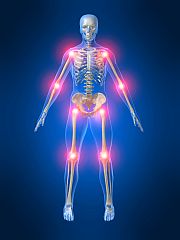Inflammation: A Key Concept in Treating Disease & Supporting Optimal Health
BY: DR. JULIE MILLER
 Inflammation is one of the body’s self protection mechanisms; the aim being to remove harmful stimuli, such as damaged cells, irritants or infections, and initiate the healing process. We have all witnessed the effects of inflammation due to injury, when the affected area becomes red, warm, swollen, painful, and mobility declines. Fever, body aches, and fatigue, common symptoms associated with the flu, are signs that your immune system is mounting an inflammatory reaction to eradicate the offending virus. Both of these are examples of acute inflammatory reactions that should subside once the threat is taken care of and the body begins to heal. However, the problem lies not in the inflammatory process itself, but if it becomes unchecked or runs out of control. Also, persistent stimuli (eg. toxins, allergens, infections, recurrent injury) can continually activate the inflammatory process resulting in tissue damage and cellular dysfunction. Although chronic inflammation has been linked to major diseases such as Alzheimer’s , type II diabetes, cancer, arthritis, heart disease, and auto-immune conditions, the effects of chronic, low grade inflammation can be much more subtle. Fatigue, muscle aches and pains, allergies, chronic congestion, digestive disturbance, frequent infections, swelling, weight gain, skin rashes, acne, menstrual problems, and poor concentration are all associated with chronic, low grade inflammation.
Inflammation is one of the body’s self protection mechanisms; the aim being to remove harmful stimuli, such as damaged cells, irritants or infections, and initiate the healing process. We have all witnessed the effects of inflammation due to injury, when the affected area becomes red, warm, swollen, painful, and mobility declines. Fever, body aches, and fatigue, common symptoms associated with the flu, are signs that your immune system is mounting an inflammatory reaction to eradicate the offending virus. Both of these are examples of acute inflammatory reactions that should subside once the threat is taken care of and the body begins to heal. However, the problem lies not in the inflammatory process itself, but if it becomes unchecked or runs out of control. Also, persistent stimuli (eg. toxins, allergens, infections, recurrent injury) can continually activate the inflammatory process resulting in tissue damage and cellular dysfunction. Although chronic inflammation has been linked to major diseases such as Alzheimer’s , type II diabetes, cancer, arthritis, heart disease, and auto-immune conditions, the effects of chronic, low grade inflammation can be much more subtle. Fatigue, muscle aches and pains, allergies, chronic congestion, digestive disturbance, frequent infections, swelling, weight gain, skin rashes, acne, menstrual problems, and poor concentration are all associated with chronic, low grade inflammation.
Causes of chronic inflammation are diverse and can be caused by both internal and external factors:
- Chronic Infections: low grade bacterial, viral, fungal, or parasitic infections continually activate the immune system resulting in inflammation. The digestive tract, sinuses, and teeth are examples of areas that can harbour such infections.
- Poor Nutrition:
- Diets high in pro-inflammatory foods such as sugar, refined carbohydrates, trans-fats, processed meats, processed and fast foods, and artificial food additives.
- Lack of foods abundant in essential vitamins, minerals, and anti-inflammatory fats and phytonutrients. Examples are colourful, anti-oxidant-rich, fruits and veggies and foods high in omega 3 essential fatty acids such as chia, flax seed, and wild salmon.
- Food Intolerances: as assessed on an individual basis, food intolerances contribute to local inflammation within the digestive tract as well as systemically. The most common food intolerances include: gluten, cow dairy, eggs, citrus fruit, tomato, peanuts, tree nuts, shellfish, and soy.
- Toxicity: environmental chemicals (eg. pesticides, PCBs, dioxins, phthalates) and heavy metals (eg mercury, lead, arsenic) are major causes of immune dysregulation and chronic inflammation.
- Obesity: fat cells (specifically abdominal fat cells) secrete inflammatory chemicals that fuel the fires of inflammation and contribute to insulin resistance and type II diabetes.
- Blood Sugar Imbalance: high blood sugar, as a result of poor diet and lack of exercise, leads to high insulin, both of which are pro-inflammatory state and lead to type II diabetes
- Psychological Stress: prolonged stress alters the ability of cortisol to regulate the inflammatory response thus contributing to runaway inflammation.
Although acute inflammation is a necessary process in the body, it is important to address chronic inflammation. Diet is the foundation of any plan to reduce inflammation in the body in that avoiding foods that feed inflammation and choosing foods that fight inflammation will significantly lessen the inflammatory load. It is also important to support the organs of elimination; the kidneys, liver, and digestive tract, to enhance detoxification of inflammatory-producing toxins. There are also specific supplements, such as specially formulated enzymes (eg Wobenzym®), curcumin, resveratrol, and green tea that act as potent anti-inflammatories. As outlined above, there are many factors that can contribute to the inflammatory process, including imbalance of the immune system, so it’s important to assess each person individually and treat them accordingly.
